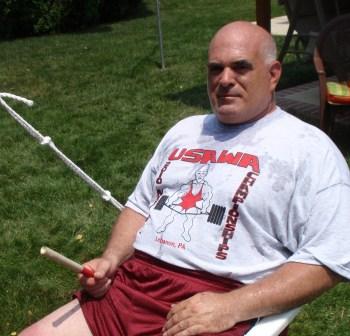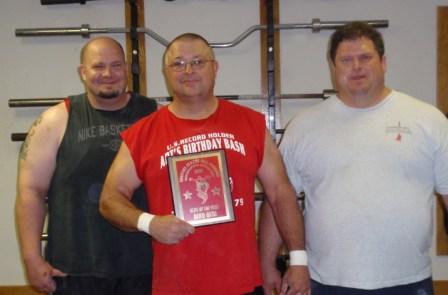by Al Myers

Level 2 USAWA Certified Official Frank Ciavattone officiating at the 2010 USAWA National Championships.
One of the big changes this past year in the USAWA was the development of an Officials Program. This started at the 2009 Annual Meeting with the approval of the new improved Rulebook that outlined the new Officials Program, and by electing Joe Garcia as the Officials Director for the USAWA. Improvements were made to the Officials Program at the 2010 Annual Meeting last month. I am going to describe and explain the USAWA Officials Program so everyone will be more knowledgeable of it. Everything I say here is outlined in the Rulebook or on the website.
The USAWA has two levels of Certified Officials – Level 1 and Level 2. Level 1 has been split into two subdivisions – Level 1 Test Qualified and Level 1 Experience Qualified. The Rulebook (Section VII. 9) explains these two levels as follows:
There will be two levels of classification for Certified USAWA officials.
• Level 1 Test Qualified – The official has passed the USAWA Rules Test.
• Level 1 Experience Qualified – The official has the experience of officiating in 25 or more competitions or events.
• Level 2 – The official has passed the USAWA Rules Test and has the experience of officiating in 25 or more competitions or events.
I want to emphasize that ALL OFFICIALS (Level 1 and Level 2) have the same authority as a Certified USAWA Official. Nothing in the Rulebook says different. It is simply a classification that details HOW one became certified. These classifications are recorded for each official in the “Officials” section of the website and are kept up to date at all times. To become a Certified Official (if you are not Experience Qualified) requires taking and passing an Open Book Exam of the USAWA Rulebook. It must be sent to the Officials Director Joe Garcia for grading. You must score over 90% correct answers to pass. Once you pass, Joe informs me to list you on the website as a current official. All of this is detailed in the “Officials” section and the Rules Test is available in several different formats, so hopefully, one will work for you to download.
One of the big changes to the Officials Programs is adding time limits to the Official Cards. The membership agreed to a 3-year Officials Card before re-certification is required. The new Rulebook (available August 1st on the website) will have this information in it. Section VII. 12 and Section VII.13 have been added to the Rulebook, as stated below:
12. Once an official has passed the Rules Test, the Officials Director will issue an Officials card that will be valid for 3 years from the date the official passed the test. Level 1 Test Qualified Officials will be required to retake the Rules Test after 3 years to maintain Certified Official Status. Level 1 Experience Qualified Officials will receive an Officials card that is valid for 3 years and will be automatically renewed unless the official has been inactive as an official during the previous three year period, in which a new Officials Card will not be issued unless the individual makes a written request to the Officials Director. Level 2 Officials are exempt from recertification, and are issued a lifetime officials card.
13. An individual must make a written request to the Officials Director in order to apply for Level 1 Experience Qualified Certified Status or to show proof of officiating experience in order to change their level of certification.
Level 1 Experience Qualified Officials were developed originally as a “Grandfather Clause” to allow those VERY experienced qualified officials not to have to take a Rules Test. These officials have always been the backbone of officiating in the USAWA and have proven their worth as a good official. However, now, if they have not been active as an official for 3 years (and officiating ONLY ONE meet in this time keeps them active) they will be dropped from the list and must make a written request to Officials Director to regain Certified Officials Status. I think this is very reasonable. Why keep someone on our Officials List if they haven’t been contributing to the USAWA as an official?? Also, if someone IS Experience Qualified and hasn’t been officiating for several years, requiring a written request from them to become active as an official again in the USAWA doesn’t seem out of line to me. It’s not much to ask of them to drop Joe or me a short letter or email about their intentions of wanting to officiate in the USAWA again. Joe and I have no way of knowing who is “Experience Qualified” without someone telling us and giving us proof. Most old meet results in the Strength Journal didn’t list the Officials. Truthfully, I really don’t understand why Level 1 Experience Qualified Officials don’t want to take the Rules Test and become Level 2 Officials. Lots has changed in the Rulebook and I’m sure they would learn something new as well as giving support to our new Officials Program.
Another new addition to the Rulebook involving officials is adding the minimum age of 16 years. Section VII.2 states The minimum age for a Certified Official is 16 years of age. Much debate arose at the meeting when this was discussed. Some felt like it should be a higher age requirement. Myself, I think 16 is a good minimum age to be an official. Afterall, I’m meeting kids on the road that age when I’m driving! I still think that at big meets (like Nationals and Worlds) more seasoned officials should be used.
I am pleased how the USAWA Officials Program is going. We started it last year with a simple system, and as time goes we are adding more requirements to make it better. I feel the reason the USAWA Official Programs have failed in the past is because they were too complicated and required too much to start with. They failed before they had the time to succeed. We still have a long ways to go before we have a great Officials Program – but at least we have SOMETHING. So as of now to become a Certified USAWA Official – all you have to do is take and pass a test!

